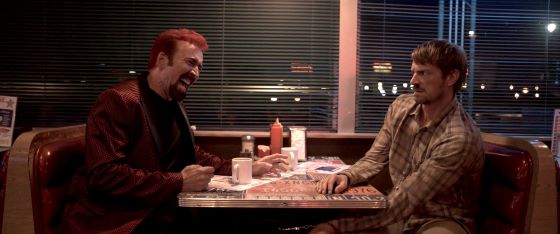

[Rating: Swiss Fist]
In Theaters July 28
An interesting hook and twist forever in search of a second act to prop it up, Sympathy for the Devil goes for a literal and metaphorical drive with a destination in mind and little else. A genuine two-hander that sports interesting, entertaining work from its leads, the film by director Yuval Adler only has two moves: intrigue and dread, with the broader story too often an afterthought. And while the central mystery of what’s going on keeps the effort afloat for a time, all the wild-eyed, Gonzo acting in the universe can’t rescue it from a plot no more complex than a grade school newspaper’s word jumble.
When the audience meets him, David Chamberlain (Joel Kinnaman) is dropping his young son off with a relative before heading to the hospital to be with his wife, who is in labor. Before he realizes it has happened, a man (Nicolas Cage) gets into the backseat of David’s car and forces him to drive away at gunpoint, starting the journey the pair will be on for the rest of the night/movie. The man (Cage is credited as “Passenger”) claims to just need a ride to visit his sick mother, but as the evening wears on, it becomes clear that he’s targeting David for a very specific reason.
Wild-eyed, cigarette starved, and quick to murder anyone who gets in his way, Passenger seems to thrive on pain, anger, violence, and chaos. Run-ins with cops, motorists, and restaurant denizens don’t alter the evening’s trajectory all that much despite serious complications, and with each development David and the audience get fragments of information that elucidate Passenger’s background and endgame. And while Sympathy for the Devil keeps the action clicking along and manages to close the loop on its story, the finale is a veritable whimper compared to the roar of the set-up.
Unmoored from the nuance and pathos that has crept back into some of his more recent work, Cage is at full froth from start to finish (we’re in Bad Lieutenant territory, here). Kinnaman is a great backstop for all of this insanity and injects proceedings with a much-needed reality check when things get turbulent. Indeed, this makes his role the more difficult of the two as he’s the Cruise to Cage’s Hoffman a-la Rain Man, here. Yet the bursts of manic violence that serve as the foundation for this interplay only obscure the fact that there just isn’t a lot of meat on the bone with this one.

The central conceit of the story relies on the audience relating to the horror of a violent maniac taking them hostage, yet that initial concept only carries it through the first act, where it gives way to the development of Passenger targeting David for a specific reason. It doesn’t spoil anything to say that there is resolution to this development, yet the reveal is so cliché and pedestrian that it retroactively lowers the stakes of everything that came before it. The sequence of events and Cage’s play on the Passenger character in light of this knowledge is meant to inform more on repeat viewings, yet nothing about what takes place necessarily demands a return to the material.
It makes one feel bad for Cage and Kinnaman, who are both giving their all and elevate the material with their genuine chemistry (to little avail). Minus one extended diner set piece, their work is confined almost entirely to the car they are traveling in, yet the pair manage to keep their interplay sharp, kinetic, and intimate. Adler also deserves credit for much of this, as the problems with the film aren’t related to the small scope of the production and its lack of sets and background crew.
No, this one rises and falls on the strength of the script, which has a 2nd and 3rd act that sets it up for quite the tumble. Adler keeps the action clicking along at a decent pace, and at just 90 minutes (with credits) Sympathy for the Devil doesn’t overstay its welcome. Cage and his trademark volatility bouncing off of Kinnaman’s relatable sturdiness make for an interesting concept, yet the story doesn’t provide them the runway needed to fully explore the possibilities available to them.
All of it is fun for a time, yet like the visual look of Passenger, with his red dye job and textured crimson blazer, it succeeds in getting your attention and little else. A straightforward mystery thriller with strong performances masking a lack of narrative depth, Sympathy for the Devil will garner little from audiences (let alone Lucifer). Fans of Cage and his volcanic theatrics will have fun with portions of the movie, yet even they will likely run out of gas before the characters in this one, who are on a literal and figurative road to nowhere.





Comments on this entry are closed.